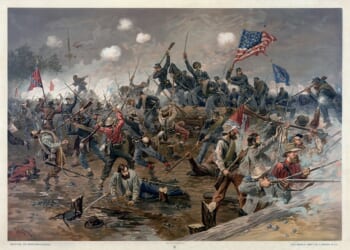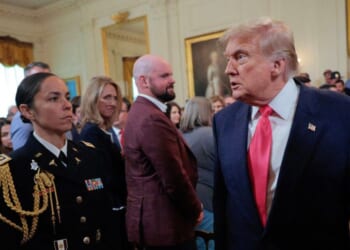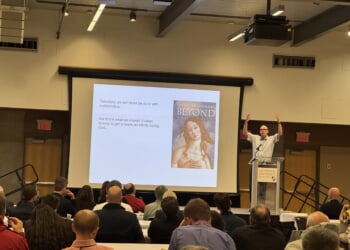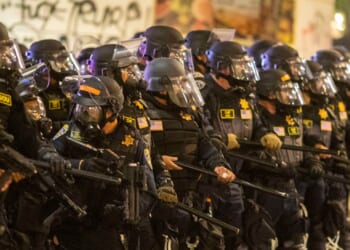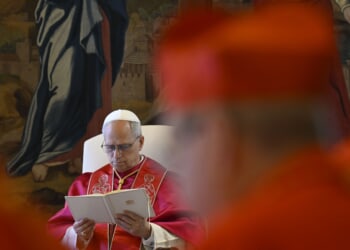Eighty years ago, on July 17, 1945, the last of the Second World War’s “Big Three” conferences was convened at Potsdam, near Berlin, Germany, in the Cecilienhof Palace. The key issues discussed and negotiated by U.S. President Harry Truman, British Prime Ministers Winston Churchill and Clement Attlee (who succeeded Churchill after Britain’s parliamentary elections), and Soviet dictator Josef Stalin were the European peace settlement, especially the future of Germany, and the still ongoing war against Japan. Many historians consider Potsdam the opening stage of the Cold War. And Harry Truman showed himself to be as naïve about Stalin as Franklin Roosevelt had been throughout the war.
Harry Truman has a historical reputation of being “tough” on the Soviets, and some of that reputation is deserved, but at Potsdam, Truman showed his amateurism and ignorance about Stalin and the geopolitical goals of the Soviet Union. In part, this was due to Truman’s own personal limitations, but it also stemmed in part from the Roosevelt administration holdovers that Truman relied on for advice and counsel during the conference — men like Joseph Davies and Harry Hopkins, who manifested pro-Soviet views (some experts have concluded that Hopkins was an “agent of influence” for the Soviets), and James Byrnes, a rugged South Carolina politico who was out of his depth as secretary of state.
The anti-Soviet advisers like Averell Harriman and Charles Bohlen were mostly ignored, while James Forrestal, who Truman biographer Alonzo Hamby called “the most anti-Soviet member of the Cabinet,” was left behind in Washington (and who flew to Potsdam on his own near the end of the conference). But as Truman would later say, the “buck” stopped with him.
Truman kept a secret diary at Potsdam, which was not made available to the public by the Truman Library until 1978. The diary reveals, as Barton Bernstein wrote, that “neither his years as senator nor his months as vice-president had adequately prepared him to deal with foreign policy.” In one of the diary’s first entries on July 16, 1945, Truman criticized Churchill for giving him “a lot of hooey about how great my country is and how he loved Roosevelt and how he intended to love me.” Truman wrote that he was sure “we can get along if he doesn’t try to give me too much soft soap.”
“I can deal with Stalin. He is honest — but smart as hell.”
The next day, Truman met with Stalin and later wrote in the diary: “We had lunch, talked socially, put on a real show drinking toasts to everyone, then had pictures taken in the backyard.” Truman concluded after that first meeting: “I can deal with Stalin. He is honest — but smart as hell.” On July 18, Truman wrote about having a “most satisfactory meeting” with Stalin, who told Truman that “he wanted to cooperate with the U.S. in peace as we had cooperated in war.” He later in the diary referred to Stalin as “Uncle Joe Stalin.”
On July 30, near the end of the conference, Truman expressed concern in his diary about what might happen if Stalin died. “I am wondering,” he wrote, “what would happen to Russia and central Europe if Joe suddenly passed out. If some demagogue on horseback gained control of the efficient Russian military machine, he could play havoc with European peace for a while. I also wonder if there is a man with the necessary strength and following to step into Stalin’s place and maintain peace and solidarity at home.”
He suggested that Molotov and Vishinsky weren’t up to the job because they lacked “sincerity,” and Maisky couldn’t replace Stalin because he was “short on honesty.” In other words, Truman credited Stalin with sincerity and honesty. It is little wonder that the Truman Library kept the diary hidden until after Truman’s death — Truman’s naïveté and ignorance are astonishing.
Truman wrote to his wife Bess as the Potsdam conference was winding down: “I like Stalin. He is straightforward, knows what he wants and will compromise when he can’t get it.” Later, in his second term, Truman told a colleague that Stalin was “as near like Tom Pendergast as any man I know.” Pendergast was the head of a corrupt political machine in Missouri that facilitated Truman’s rise to political power in Washington.
It was also at Potsdam that Truman informed Stalin about the successful test of the atomic bomb, and was surprised when Stalin reacted so calmly and matter-of-factly about it. Stalin, of course, knew all the details of the atomic bomb from Soviet spies who had infiltrated the Manhattan Project thanks to the carelessness of the Roosevelt–Truman administration’s internal security measures.
Truman usually receives much credit for instituting the policy of containment in response to Stalin’s aggressive moves in Eastern and Central Europe, the Mediterranean, and the Middle East, but it was Truman who in the months leading up to Potsdam instructed Harry Hopkins to meet with Stalin to tell the Soviet leader that “Poland, Rumania, Bulgaria, Czechoslovakia, Austria, Yugo-Slavia, Latvia, Lithuania, Estonia, et al make no difference to U.S. interests.” It was an invitation to Stalin — not that he needed one — to bring down the “iron curtain” on Central and Eastern Europe.
READ MORE from Francis P. Sempa:
The Knives Are Out for Elbridge Colby
Another Reason to Celebrate the 4th of July: Vicksburg
The Largest, Deadliest Battle of the Civil War Occurred by Accident









